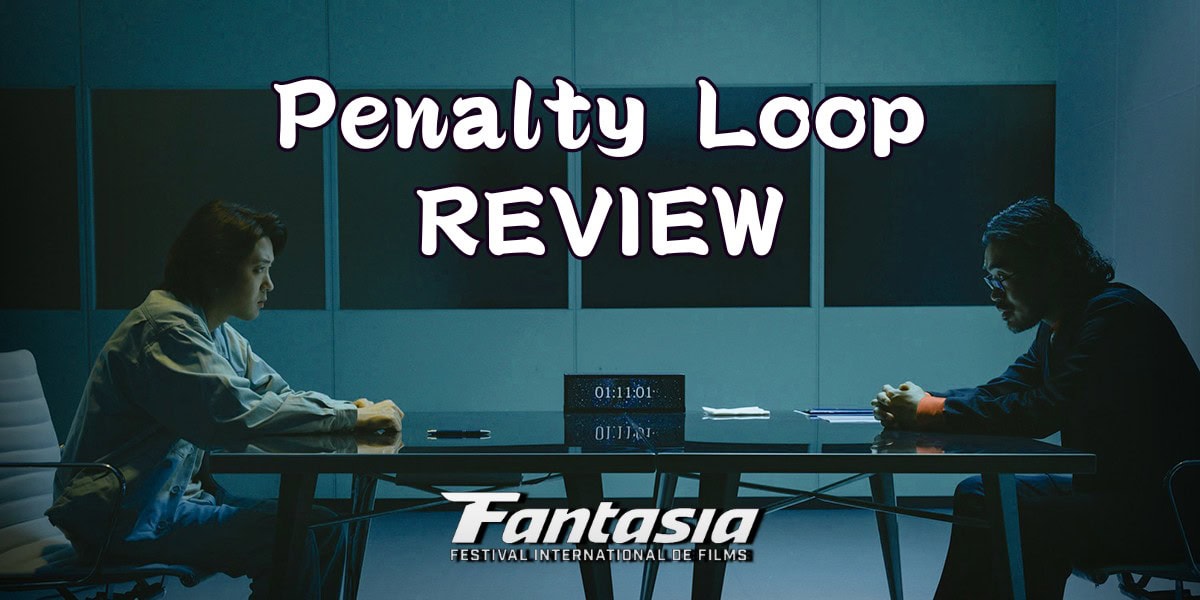Fantasia Fest 2024 Review: ‘Penalty Loop’ Reinvents Time loop Cinema

Before Shinji Araki’s Penalty Loop played in front of a sold-out crowd at the Fantasia International Film Festival, audiences were treated to the classic advertisement for Nongshim noodles not once but twice. At first, I didn’t grasp why this happened (although the real ones know the ad played an endless number of times in front of Park Chan-wook’s Oldboy last year). Then I realized that the projectionist was playing a trick on us: the film centers on a time loop, so why not stick the audience inside a Nongshim PENALTY LOOP? No matter how often the crowd has seen the advertisement, they still erupt in thunderous applause. Describing it is inexplicable, but witnessing it is something else, and is an experience you must see to believe.
Competing for the Cheval Noir Award, Penalty Loop attempts to reinvent the structure of time loop cinema, which, if we’re being honest, is one of the very worst sub-genres of science fiction. There’s so much you can do before it eventually becomes trite, clichéd, and unengaging.
Most time-loop movies, unfortunately, fall into the same tropes that Harold Ramis laid out in 1993’s Groundhog Day with no formal reinvention of the sort. However, Araki gives us a fresh perspective on the sub-genre with a brutally violent edge, even if its final reveal lands with a thud.
Plot summary of Shinji Araki’s Penalty Loop
The conceit is simple: Jun (Ryuya Wakaba) wakes up on June 6th at 6:00AM (06/06/6:00AM – the number of the beast!) and exacts revenge on the man who murdered his lover (played by Fly Me to the Saitama’s Yûsuke Iseya). Jun stabs him violently after poisoning his coffee and dumps his body in the river. Case closed. But he wakes up once more on June 6th at 6:00 AM, forced to kill him again, again, again and again.
Then, Araki brilliantly subverts expectations by cutting away from Jun and going to the killer’s perspective, waking up in his car while it’s driving on June 6th at 6:00AM. He is also stuck in the time-loop and begins to realize why Jun is after him. The two then decide to play around until we realize that Jun is not actively killing him, but that his actions are beyond his control. No matter if he decides he will not kill him, Jun still ends up taking his life by the end of the day.

One such scene inside a bowling alley is the film’s most technically impressive and thematically intriguing set pieces. The use of neon colors, in particular, fills the alley’s environment, as Jun attempts to fight back the forces attempting to kill the murderer deftly mixes impeccably timed comedy with cathartic action. Araki isn’t afraid of going violent, and sometimes goes in a gnarly direction that may be unwelcome for some, but is always in service of how brutal and unforgiving Jun’s penalty loop is.
A time loop movie with a darkly funny edge
If you don’t vibe with Araki’s darkly funny tone that permeates the film, chances are you won’t enjoy Penalty Loop. But the constant game of cat-and-mouse that Jun and the murderer play with each other was so fun that I was immediately hooked to see what would happen next. It also helps that both actors have terrific chemistry, modulating raw emotional power in some of the film’s darkest sequences with stellar physical comedic skills. Each ‘punchline’ hits so well on screen, and the film is frequently met with incredible reactions from the audience, especially when Jun has more than one trick up his sleeve.
Final thoughts on Fantasia Fest’s screening of Penalty Loop
All of these brilliantly subversive moments pull you into the picture, and it’s hard not to stray away from it, even if the movie fumbles the bag with a twist so uneventful it almost sinks the entire movie. While not as bad as the affront to the fundamentals of screenwriting in Nobuhiro Yamashita’s Confession (which is also competing for the Cheval Noir otherwise), the facile way out Araki chooses for Penalty Loop dilutes the emotional journey we have spent with the protagonists as they look for an exit strategy from the time loop.
The concept itself is great: a time-loop that punishes both characters for their actions (one has to live through his death repeatedly, while the other can’t get rid of him as easily as he thinks). However, once we learn more about the origins of the “Penalty Loop” and how it operates, Araki’s writing seems far less engaging, and it’s hard to stay interested once we know the truth about Jun’s plight.
Regardless of this, Penalty Loop still enthralls thanks to its riveting chemistry between Wakaba and Iseya, and a great sense of comedic timing between the two that continuously keeps us locked into the story, even if it almost fumbles the bag by its end. It may not have the most refined screenplay in the world, which honestly feels like a shame. However, there’s no denying Araki’s film will be a massive crowd-pleaser once it eventually makes its way beyond the festival circuit, which is honestly what all directors aspire to have.
For more about Penalty Loop at Fantasia Fest 2024, see Fantasia Festival’s website. Are you interested in seeing this movie? Or have you seen it? Let us know what you think on social media @mycosmiccircus!
Fantasia Fest 2024 Review: Brave Citizen Meows the Fantasia Audience Away




